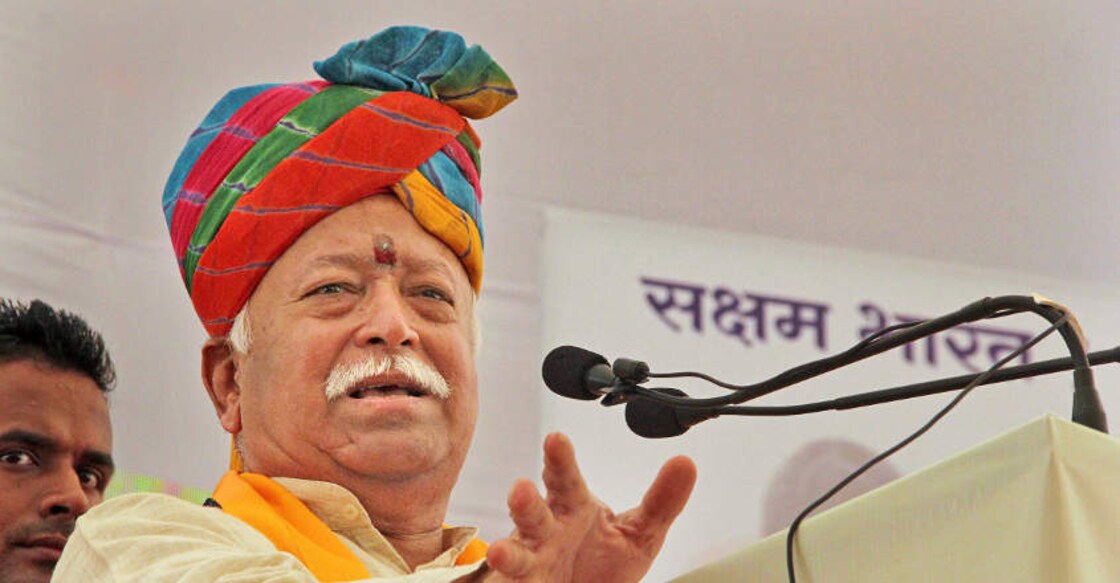Bhagwat's Dussehra speech sets poll agenda for BJP

Mail This Article
There was never any doubt about the Bharatiya Janata Party's (BJP) anti-minority electoral gambits but the agenda has now been unambigiously and forcefully articulated by the party's friend, philosopher and guide, the Rashtriya Swayamsevak Sangh (RSS).
Delivering the organisation's customary message on the occasion of Dussehra/Vijay Dashami, its chief, Mohan Bhagwat, has left no stone unturned about what the Narendra Modi government should immediately do -- start building the Ram temple in Ayodhya even by enacting an ordinance.
By pointedly ignoring the fact that the issue is currently before the Supreme Court, the RSS chief has taken the party and the Hindutva brotherhood to the days of the Ramjanmabhoomi movement in the 1990s when the saffron storm-troopers used to say that the courts can have no say in a matter of faith.
Apart from a reiteration of this aggressive "religious" stance, Bhagwat's directive to the BJP to get down to business and not dilly-dally any longer on building the temple has scrapped Atal Behari Vajpayee's decision in 1996 to put in cold storage the three "core" issues of the Sangh parivar -- building the temple, doing away with Article 370 of the Constitution conferring special status on Jammu and Kashmir, and introducing a uniform civil code
That the negation of Vajpayee's wishes has been done in the year of his death is not without significance. It remains to be seen whether the RSS will give any "advice" to the government on the two other issues -- Article 370 and the uniform civil code.
But why the sudden hurry about constructing the temple? There may be two reasons. One is that it is the last throw of the dice by the party and the parivar in an election season to consolidate its vote bank of communal-minded Hindus at a time when the less than favourable economic scene may make sections of the liberal Hindus, who voted for the BJP in 2014, drift away.
The other is the realisation in the saffron brotherhood that it is now or never where the temple is concerned since the BJP is unlikely to get a majority on its own in the Lok Sabha in 2019. The National Democratic Alliance (NDA) led by it may get it, but it will not be easy for the BJP to persuade some of its allies such as the Janata Dal (United) -- which has opposed the BJP's favourite triple talaq ordinance -- and the Akali Dal to endorse a construction programme which cannot but alienate the minorities.
Notwithstanding BJP president Amit Shah's conviction that the party will reign for half a century, there may be an awareness in the organisation that the 2014 outcome was the result of several unforeseen events -- the Congress's sudden and somewhat inexplicable collapse and Modi's emergence (against the wishes of several in his party) as some kind of a messiah. From this standpoint, 2019 will not be the same as 2014.
Ever since the party and the parivar sensed that the mantras of neither "achhe din" (good days) nor "sabka saath, sabka vikas" (development for all) is evoking a favourable response, the focus of the saffron propaganda has been on Hindu-Muslim polarisation.
Whether it is extending the scope of the National Register of Citizens (NRC) from Assam to other states or the removal of long-established Muslim names in Uttar Pradesh like Mughalsarai and Allahabad, the BJP's aim has been to send the message that Muslims will be under pressure to prove the genuiness of their citizenship and that India's multi-cultural past will be erased as Hindu rashtra takes root.
Along with the direct and indirect offensive against Muslims, the parivar is also intent on confirming its Hindu credentials by opposing the Supreme Court's verdict allowing women of all ages to enter the Sabarimala temple in Kerala on the grounds it violates centuries-old beliefs.
The Sabarimala episode enables the RSS and the BJP to try and kill two birds with one stone. One is to project themselves as the standard-bearers of Hinduism, and the other is to flaunt a defiance of the Supreme Court.
The court has aroused the saffron lobby's ire ever since it delivered a series of "progressive" judgments (of which Sabarimala is one) such as the one upholding the rights of privacy, which the government argued was an elitist concept, and the other was to decriminalise homosexuality in a case from which the government recused itself evidently because while the legalisation went against the BJP's crusty orthodoxy, the party could not afford to be seen as living in Victorian times.
Sabarimala has given an opportunity to the RSS and the BJP to defy the apex court and suggest that it is not right all the time. The defiance may have also been motivated by the #MeToo movement which has claimed the scalp of a Union minister and persuaded another minister to say that those who support the movement are "perverted".
Among the others who also answer to the description of being perverted are the so-called "Urban Naxalites", a new form of abuse coined by the RSS and the BJP for the Left-Liberals who have always been called anti-nationals. Not surprisingly, another of the RSS chief's advice to the government was to keep the "Urban Naxalites" under surveillance.
It will be interesting to know what those "secularists" who interacted with the RSS recently like former President Pranab Mukherjee and the business tycoon, Ratan Tata, think of the pitch for the temple and the castigation of "Urban Naxalites".
(Amulya Ganguli is a political analyst. The views expressed are personal.)

